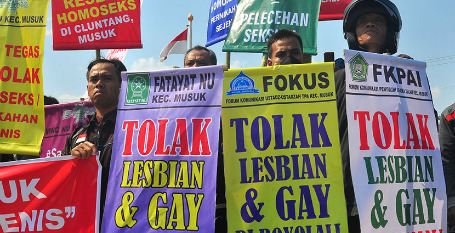LGBT communities in Indonesia are facing unprecedented levels of harassment. Activists and commentators describe LGBT hiding their sexuality and living in fear.
"This is the first time it's actually lasted this long," Dede Oetomo, a prominent activist who founded one of the country's oldest LGBT rights groups, GAYa NUSANTARA, told Reuters.
"We are supposed to be a danger to survival of the nation," Oetomo said. "It's getting ridiculous in a way. It sounds like a little war."
This “war” began in January when Higher Education Minister Muhammad Nasir said LGBT people should be barred from university campuses.
Since then, the national broadcasting commission reiterated a policy banning TV and radio programs that make LGBT behavior appear "normal.” The government put pressure on messaging and social networking apps to remove LGBT stickers and emoticons, and the The
Indonesia Psychiatric Association classified homosexuality, bisexuality and transgenderism as mental disorders.
"What we're seeing now may be unprecedented in terms of its fever pitch," said Kyle Knight and LGBT rights researcher who is documenting human rights abuses related to the rise in anti-LGBT rhetoric in Indonesia.
"This time around, government officials have even stoked the cacophony of hatred."
Lesbians, gays, bisexuals and transgenders have said that the fear of discrimination and abuse has led them to be more discrete online and offline.
"Normally I just share everything gay about me," said Safir Soeparna, who works for Apcom, a Bangkok-based group focusing on HIV in gay men. "Now I'm a bit like ... will somebody use this to blackmail me? So I rechecked my 'friend' list and deleted people I can't trust 100 percent."
The staff of Arus Pelangi, which provides legal assistance for LGBT people, set up a buddy system in January because police could not guarantee their security, and started a hotline for people needing help, Chairwoman Yuli Rustinawati said.
Oetomo is also taking steps to protect himself and his staff. ”My guys don't even go to the office any more. It's too dangerous. We've never really experienced this," Oetomo said.

